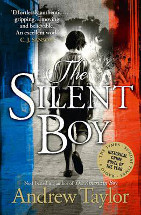The silent boy by Andrew Taylor

Harper, 2015. ISBN 9780007506606
(Age: Young adult/adult) Highly recommended. Crime, Historical
novel, French Revolution, Eighteenth century England. When young
Charles sees his mother, Augusta killed during the first stages of
the French Revolution, he keeps himself quiet and unobserved, not
saying a thing, just like she said. So he does not speak. At all.
Emigres take him to England and he finds himself in a country house
with a man who was a friend of his mother's and insists he is
Charles' father. Savill, estranged husband to Augusta has a claim
and wants to do the best for the boy even though he knows he is not
his son. But he is commissioned by the enigmatic Rampton a childless
civil servant within the Post Office, great uncle to Augusta, to
fetch the child from the country as he needs an heir. Savill goes on
his quest armed with an array of documents giving him the legal
power to take the boy, but suffering from tooth ache is laid up for
several days. During this time the child is kidnapped, and so the
hunt is on.
This is a surprising story. At first I found it rather muddled, and
the disjointed writing did not help, but I persevered as the setting
is so well defined, and found it a gripping read. Chapters in the
past tense carry most of the action, while those in the present
revolve around the mute boy and his activities at staying alive.
When a young woman reads him the story of Robinson Crusoe he deems
that flight to the safety of an island is his only option, so he
escapes from his captors several times, making Savill's hunt even
more precarious. Cat and mouse chapters follow, with Charles falling
into the hands of a variety of people, and Savill being often just
one step behind the lad. The plot delves and dives into some amazing
places with an array of great characters to keep the readers'
interest.
Above all the reader will want to know what happens to the boy, and
why he has been struck dumb, while the descriptions of life in both
town and city in eighteenth century England makes for a fascinating
backdrop to the tale.
Fran Knight